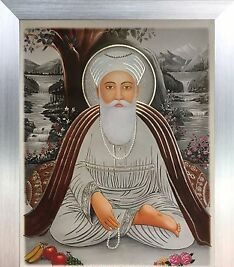
Dhan Guru Nanak (20 October 1469 – 7 May 1539) is the founder of Sikhism and the first of the ten Sikh Gurus.
He was born in the village of Talwandi, now called Nankana Sahib, near Lahore in present-day Pakistan. His parents, Mehta Kalu and Matta Tripat, were Hindus and belonged to the merchant caste. Even as a boy, Nanak was fascinated by religion, and his desire to explore the mysteries of life eventually led him to leave home.
Nanak married a woman named Sulkhni, of Batala; together, they had two sons, Sri Chand and Lakhmi Das. His brother-in-law, the husband of his sister Nanki, got a job for him in Sultanpur as the manager of the government granary, but his employment there wouldn’t last long.
One morning, when he was 28 years old, Nanak went (as usual) down to the river to bathe and meditate. It was said that he was gone for three days. When he reappeared, filled with the spirit of God, he said, “There is no Hindu and no Muslim.” It was then that he began his missionary work and the religion of Sikhism was born into the world.
Dhan Guru Nanak Devji’s journeys, successors
Tradition states that Nanak made four great journeys, traveling to all parts of India, and into Arabia and Persia; visiting Mecca and Baghdad. He spoke before Hindus, Jains, Buddhists, Parsees, and Muslims. He spoke in the temples and mosques, and at various pilgrimage sites. It was during this period that Nanak met Kabir (1441-1518), a saint revered by both Hindus and Muslims.
Wherever he went, Guru Nanak spoke out against empty religious rituals, pilgrimages, the caste system, the sacrifice of widows, of depending on books to learn the true religion, and of all the other tenets that were to define his teachings. Never did he ask his listeners to follow him. He asked the Muslims to be true Muslims and the Hindus to be true Hindus. Find out more with the video below.

